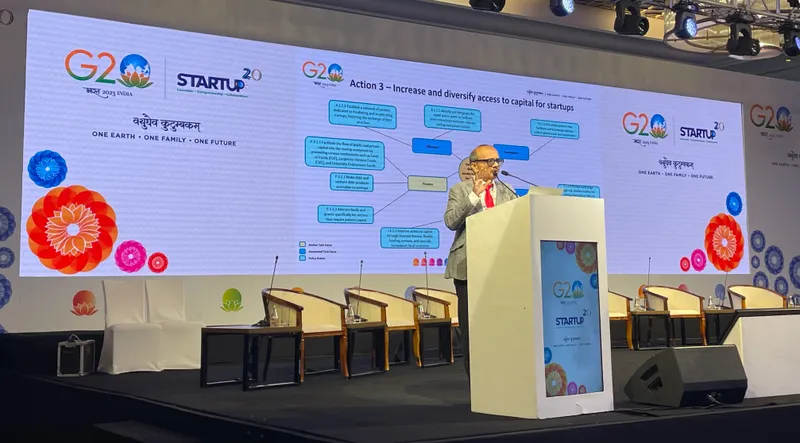Goa could give fierce competition to startup hubs like Mumbai, Gurugram, and Bengaluru: Dr Chintan Vaishnav
Dr Chintan Vaishnav, the chairperson of Startup20, believes that Goa has the potential to become a thriving startup hub in a few years with the right support and resources.
Key Takeaways
- Goa is embracing its own unique identity to foster the growth of startups, says Startup20’s Chairperson Dr Chintan Vaishnav
- Goa has nearly 400 registered startups at present, with a population of 15.7 lakh. As per Vaishnav, Goa has the potential to pioneer in every sector and category.
- The ultimate goal of Startup20 is to carry the suggestions to the 2024 G20 meeting in Brazil.
Bengaluru, Gurugram, and Mumbai – the top three hubs for startups in India – will soon face fierce competition from Goa, according to Dr Chintan Vaishnav, Chairperson of Startup20 India and the Mission Director for Atal Innovation Mission (AIM).
“Goa has emerged to be a favourable hub for startups in India,” Dr Vaishnav told YourStory on the sidelines of the third meeting of the Startup20 Engagement Group under India’s 2023 G20 Presidency, held in Goa last week. Dignitaries from several countries including Denmark, Austria, Australia, Sweden, EU, Brazil, Oman, Canada, Indonesia, Mexico and Estonia discussed how policies can be shaped to drive growth and success in startups in their respective nations.
According to the Chairperson, there are several reasons why startups can thrive in Goa. Firstly, the Goa government is extending all forms of support in terms of policy. Secondly, weather and accessibility is an advantage which is attracting entrepreneurs from all over the country. Thirdly, Goa’s popularity among the young and the aspiring will bring young entrepreneurs to the region.
Goa has nearly 400 registered startups at present, with a population of 15.7 lakh. “That’s one startup in about 4,000 people which is in line with many mid-tier European nations,” Dr Vaishnav said.
At least half the number of startups incubated at the Atal Incubation Centre (AIC) under AIM at the Goa Institute of Management cater to the hospitality and food and beverage (F&B) sectors, which makes Goa stand out from other startup hubs, according to Dr Vaishnav.
The government has built 69 AICs in the country so far, with plans to increase the total number of AICs to 101, he said, adding that the government has also created 10,000 Atal Tinkering Labs (ATLs) that have sensitised over 75 lakh school students to innovation and entrepreneurship.
“Goa is embracing its own unique identity to drive startup innovation,” he added.
However, Goa has the potential to pioneer in every sector and category, Dr Vaishnav said, noting that software-as-a-service (SaaS) and other digital-first startups will also have great significance in the region.
Startup20 deliberations could also result in the influx of foreign capital for startups across the country, he added.
Jan Bhagidari
Startup20 serves as a dialogue forum for stakeholders of the global startup ecosystem, and aspires to represent the ecosystem to G20 leaders in order to address macroeconomic issues and challenges experienced by entrepreneurs.
The engagement group operates through 5 main task forces – foundation, alliances, finance, inclusion, and sustainability – which are structured to develop priorities and bring forward topics for which recommendations would be formulated to support startup ecosystems globally.
The consortium held its first meeting in Hyderabad in January, and the second in Sikkim in March.
At the second meeting, Dr Vaishnav told YourStory that Startup20 is arguably the highest stage for global startup policymaking. “The hope is that this group will produce recommendations that will get woven into conversations between countries to make the life of startups easier in serving the world,” Dr Vaishnav had said.
Taking the agenda forward, Dr Vaishnav remarked during the opening speech in the Goa meeting that delegates across the world gathered once again with the aim of conceptualising formidable ideas and policies to benefit all the 20 nations. The forum also included suggestions and feedback of ecosystem stakeholders such as founders and investors. Hence, one of the themes of the meeting was “jan bhagidari” which means public participation.

Dr Chintan Vaishnav at Startup20 summit in Goa
Representatives of different countries deliberated on five key action points:
- To create and adopt a global startup definition and framework
- To create a network institution to support startups and institution stakeholders across G20 nations
- To increase and diversify access to capital for startups
- To ease market access for startups
- To emphasise the inclusion of under-represented communities and the ability to scale startups of global interests
The two-day conference concluded on a plan to achieve the action points with joint effort from all participants. “We are now confident that we can now scout startups globally, fund them collectively, mentor them contextually, and scale them internationally,” Dr Vaishnav told reporters at a media briefing on June 4.
When asked about the one key milestone Startup20 has been able to achieve so far, Dr Vaishnav said that it has managed to start discussions about harmonising the global startup ecosystem while allowing the national ecosystem to grow as it wants.
“The ultimate goal is to ensure these points make it to the 2024 G20 meeting in Brazil,” he added.
Edited by Akanksha Sarma








